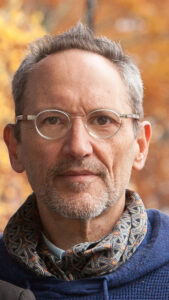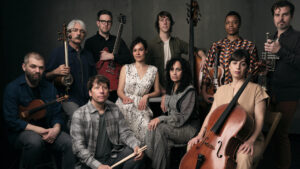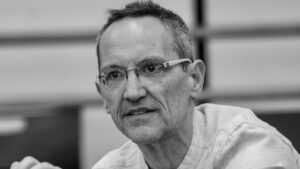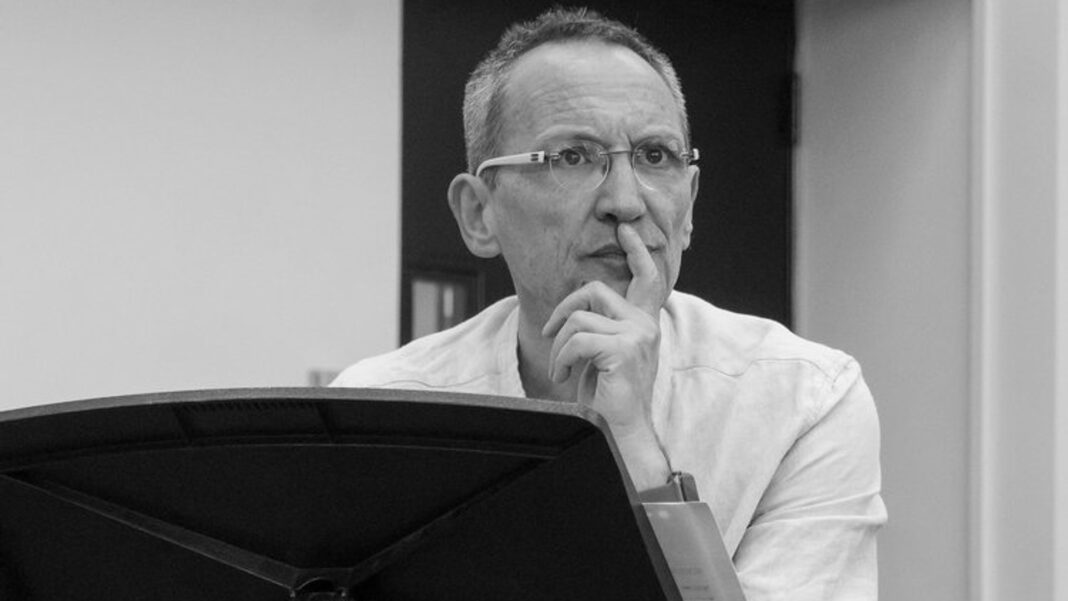In 2014 Jessica Cohen’s translation of David Grossman’s Falling Out of Time earned rave reviews. The book tells the story of parents who go on a long walk with no particular destination after the death of their child. Along the way numerous other people facing various types of loss join them. It may seem like an unlikely subject matter for a song cycle, but for composer Osvaldo Golijov it was the right book and the right project at the right time.

Born in Argentina, Golijov took the contemporary classical music world by storm in 2000 with the debut of La Pasión según San Marcos. His 2003 opera Ainadamar and his 2004 song cycle Ayre are performed around the world. In fact, Scottish Opera is performing Ainadamar on tour in Glasgow and Edinburgh beginning on Saturday.
Then for multiple reasons Golijov’s muse seemed to go into hiding. For a decade there would be no new works from him. As he told Corinna da Fonseca-Wollheim in the New York Times in 2020, “I was really depressed…It was painful. And then it was peaceful, and now it is liberating.” Grossman’s book was part of his liberation.
Golijov’s song cycle, also named Falling Out of Time, is being performed on tour by the musicians for whom the composer wrote the work: Silkroad Ensemble. The first performance takes place on October 27th at The Wallis Annenberg Center for the Performing Arts. (See the end of this interview for the full schedule).
Late last month I spoke via Zoom with Golijov about themes of loss, the power of walking and his plan to write more joyful music moving forward. What follows are excerpts from that conversation that have been edited for length and clarity. If you’d like to see the full interview, please go to our YouTube channel.
You regularly ask your students, in a follow-up to George Crumb’s statement, “Music is a system of proportions at the service of a spiritual impulse,” what is the spiritual impulse for which they have to find the proportion? What was the spiritual impulse so that you could find the proportion and the compositional structure of Falling Out of Time?
I think it’s two impulses. One is the fear, to the extent of becoming a failure of the imagination, of what that experience is in life of losing a child. I think that any parent probably has the same. But more than that I personally know seven sets of parents who have lost children. I realize that we all turn our gaze away from them. It’s such an unimaginable loss that we make believe, “Oh, you know. This didn’t happen.” I think that is a terrible thing. So I guess that’s the impulse – I’m forcing myself to not turn my gaze away from something. It goes against what we think are the laws of nature.
What I need is a desire to accompany these people up to the point where someone that experiences such loss can be accompanied, because grief is isolating. So it is a little bit of an impossibility, but yet I did not want to go through life without at least attempting to create this act of accompaniment. Again, knowing the limitations of that accompaniment.
What is your personal relationship to grief and how did that find its way into your music?
I don’t consider myself to be very unique as a person, in terms of experiencing things deeper than other people. But I realize that I do have, like other composers or other creators, this ability to perhaps translate the experience, not necessarily personal, but what I feel that people are experiencing into what you call, rightfully so, proportions.
To answer more directly your question I do tend to be more private in my grief, I guess, than other people, perhaps. I don’t see that as a good quality. So perhaps through the music I can connect in ways that I cannot connect as a person.
David Grossman told The Guardian, “In order to do almost anything, you have to act against the gravity of grief. It is heavy. It pulls you down and you have to make a deliberate effort to overcome it. You have to decide that you won’t fall.” Do you think that the act of creativity requires that, or is that just the act of living?

I think that what he says rings true to me. I wouldn’t generalize it to any act of creativity, because sometimes you are simply joyous. I imagine Bach had such vitality and Mozart. Knowing David, I think that is very true. He’s also a source of creativity. But I do understand that in this particular kind of a creation you have to go against a certain tremendous gravity, right?
You did a really interesting interview with with Corinna da Fonseca-Wollheim where you talked about the ten year drought that you had experienced leading up to this. In re-reading that interview it struck me as though that journey may be very similar to what The Walking Man in Falling Out of Time has to deal with in terms of getting over loss and finding a way to breathe. Is that is that a fair assessment?
Yeah, definitely. There is a parallel there. I think that is important in at least the way I perceive the journey of The Walking Man and the journey of people that experience these, quote unquote unnatural laws. To realize that there’s no Hollywood ending, no acceptance, obviously no triumph, no redemption. But there is what you just said is finding, once in a while, a place where you can breathe. And that’s enough.
There are a lot of people who use walking as a way of overcoming situations. Whether they do the Camino de Santiago across Spain or the Inca trail in Peru, walking seems to be a way for people to come to grips with whatever circumstances they are facing or to come to new enlightenment about what it is they’re going through. What role has walking played in your life in terms of being able to free yourself emotionally, free yourself creatively?
I love the metaphorical walkers in music like Schubert or Mahler. But in my case it’s more like swimming. I know that for David walking has always been a real thing in his life. He starts every morning walking a few miles. In my case, for at least ten, 15 years I say to my partner, “Let’s do that Camino de Santiago. When will we do that?” But one day we will do it. I think that is something amazing. Just the fact that people conceived of the idea of pilgrimage. Which in the end this is arriving to yourself, right? I love the metaphor very, very much. Unfortunately I’m more of a water animal than a land animal.
David’s novel, and your music by extension, depict a world where grief is universal, which, of course, we know that it is. But what I also love is that it’s democratic, it’s apolitical. Regardless of the circumstances, it seems like we have a way of better understanding who we are at our core when we recognize the similarities. I think that your music and David’s novel remind us who we can be regardless of our borders, regardless of our political ideologies. Is there a bigger statement that you and David want to make about the world in which we live in and how much we share in common versus what our differences are?

That’s just true. Before I even knew David’s book I wanted to do a piece about this, but it was more political. I’m happy that I didn’t succeed in that. I had two attempts. One was an opera for Tanglewood. In the end I ended up writing Ainadamar. It was about parents who lose children in the Middle East, both Israelis and Palestinians. Then I started Iphigenia for the Met which also had a political component. That didn’t work out. These two failures led to something that I think is much more true to the human experience. Like you just said, that transcends politics.
Is the act of composition a political act?
Political. I don’t know. It might be, I think, a little even deeper than political as a faith act – an act of of believing that life transcends death. Because why would anybody create anything if the end is death? It’s defiance of death itself, right? I guess I’m not articulating it properly, but I think it’s even deeper than purely political. But I think that any act of true creation is an act of faith in life.
How you think this work resonates now that we’ve been through almost three years of incredible loss worldwide as a result of pandemic, or we’re seeing what’s going on in Ukraine with circumstances that yield to a parent losing a child. Do you think that this work resonates differently now than when you wrote it?
Perhaps? I think yes. In one sense there are certain things that most of us consider that we understand. Yes, their grandparents die and parents die. Then some of our friends, then we do. But we don’t think about a parent outliving a child in the same way. In a more global way we did not think about the world stopping and people starting to die of all ages. So in this sense the piece speaks to something that is, quote, unquote, unnatural or quote unquote, illogical, such as the death of a child or a pandemic. Yes. The work resonates in a way that would not have resonated before the pandemic.
On the other hand you know how we are. We want to forget very quickly, right? Even myself. I wrote in my whiteboard “write just happy music for the next ten years.” You know what I mean? So the answer to your question is yes. And life goes on.
To see the full interview with Osvaldo Golijov, please go here.
Falling Out of Time by Osvaldo Golijov will also be performed at The Chan Center in Vancouver on October 29th; The Reser in Portland on November 1st; The Harris in Chicago on November 3rd; The Clarice at the University of Maryland on November 5th and Annenberg Center at the University of Pennsylvania on November 6th. (You can click on each venue’s name for tickets and more information.)
Falling Out of Time has been recorded and is available for streaming or purchase.
Main Photo: Osvaldo Golijov (Photo by Stephanie Berger/Courtesy osvaldogolijov.com)










